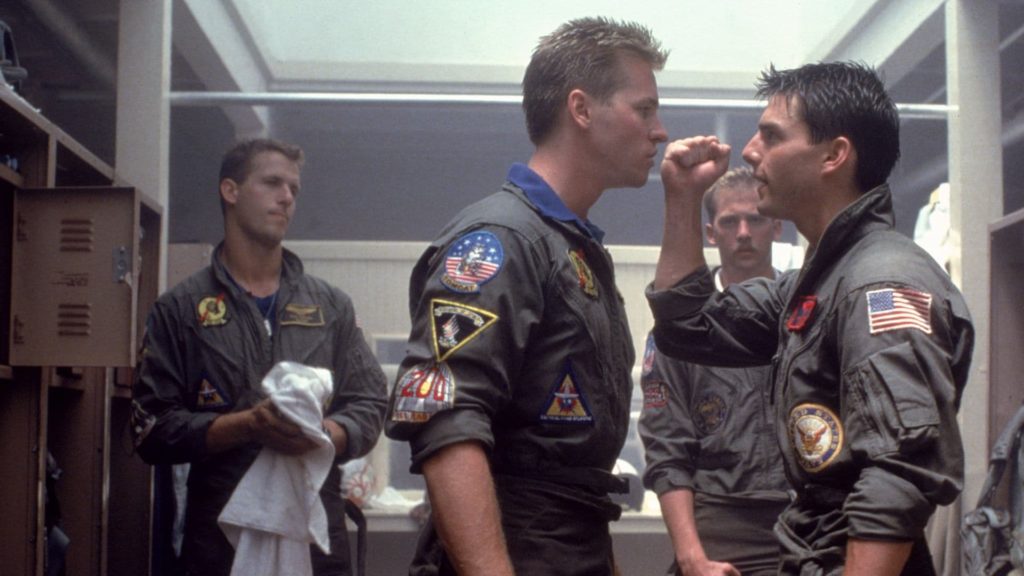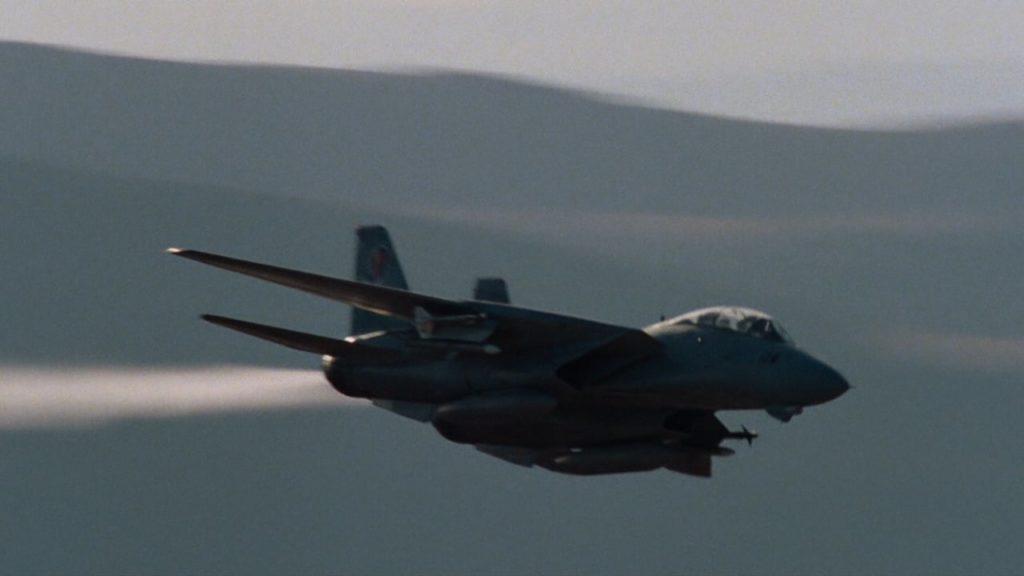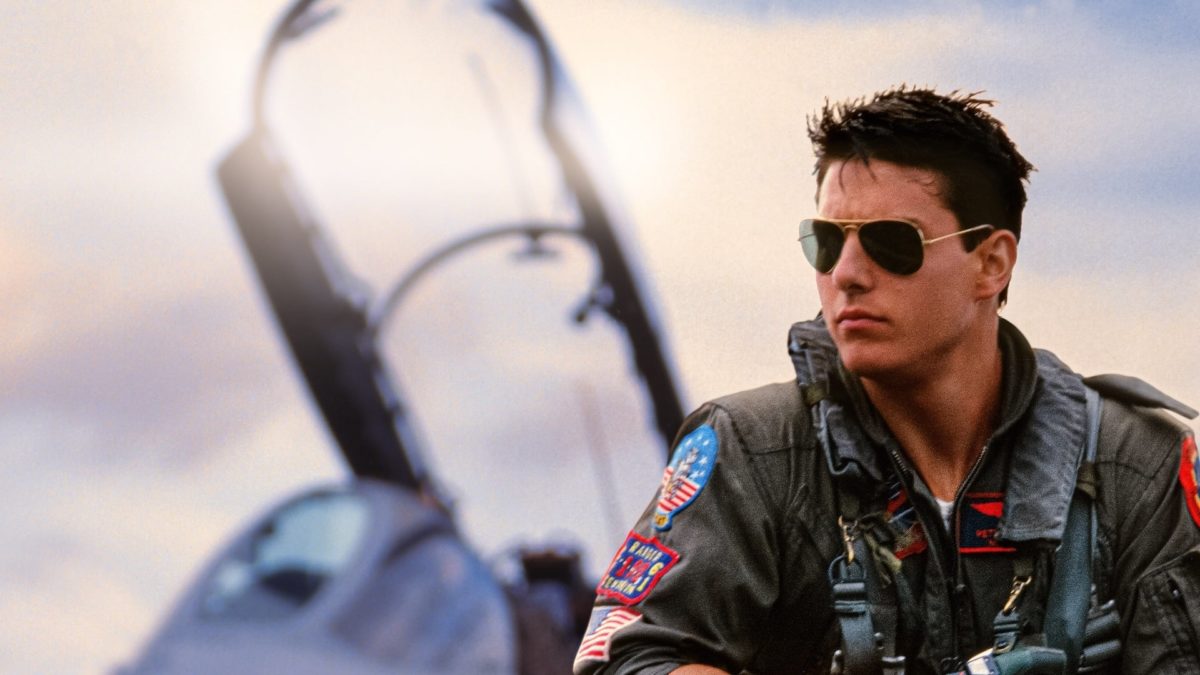Highway to the bang her zone
Top Gun understands that, for young men, everything is about sex. Its entire plot is about sex. Every scene, every character, every beat? Sex. You have a hotshot named Maverick who really knows how to use his “Tomcat,” obsessed with slaying “bogeys” by ejaculating missiles. He tussles with his sexual rivals, with whom he has a companionship that lives on a sliding scale from friendly to posturing to erotic. I think it’s no coincidence that Goose dies just a couple of scenes after we meet his wife and family: he moves on; he exits the game. It’s no coincidence, either, that the woman Maverick falls for is the one who can finally teach him things he doesn’t intuitively know; that his first and last conversation with her he professes (facetiously) to being a rookie with no moves, flying blind in his pursuit of her, with secrets only she can teach him, while he can still solve some of her own mysteries. He spends the whole movie wondering if he can ever be as much of a stud as his enigmatic father. When he’s feeling alone and unmoored, he just needs to ride his own hog for a bit. Sex from bottom to top.

I think that undercurrent of sexual struggle, if you can even call it an “undercurrent,” is what makes the energy in Top Gun so enticing. It is a movie propelled by deep, instinctual urges. Its elemental dramatic matter dates back to Greek drama. It is, in its own peculiar way, a coming of age story even more than it is a Navy recruitment ad (though it certainly is that).
The story, as I’m sure you know, is that Maverick gets sent to an elite flying school where he becomes a world-class MiG-slayer, only for his confidence to erode when his wingman dies during a training exercise. Just in time, that confidence returns for a great big climax, this time in a real dogfight; Maverick and his buds bukkake missiles until the day is won.
The film is often lumped in with dumb and obvious blockbusters, and there’s something to that. The banter is all pseudo-jargon and surface-level bravado, ancillary to the core purposes of the story. Like plenty of great pop-art movies (and, yes, this movie is truly great), Top Gun showcases the difference between great dialogue, which it does not feature, and great story, which it certainly does. The movie’s narrative gears churn smoothly and tirelessly; every scene fleshes out some erotic theme or else builds up/tears down a main character.
Top Gun looks absolutely terrific. The visual identity is what makes everything else in the movie work. The movie is most famous for its incredible photography of fighter jets, and as a piece of spectacle, it undoubtedly delivers. There’s a visceral thrill to the phallic machines of war, screaming through the skies, dancing and gliding and challenging and parrying. It’s military-industrial porno.

But there’s more to the film’s visuals, crafted brilliantly by Tony Scott, beyond the planes. This is a richly colorful movie, with engaging spaces and compositions in which characters interact and, occasionally, reflect in private. We spend most of the time in classic young-man domains: bars and locker rooms and lecture halls, etc. There’s something slightly otherworldly about the cinematography, as if we are living in a quasi-real space between Maverick’s id and the world he lives in. The cadence to the editing kept me always curious and slightly on edge, never bored for 100 minutes that shoot by faster than an F-14A.
The acting is uneven, but, again, this is somewhat secondary to the film’s primary objectives. I find this to be a rather unremarkable Tom Cruise performance even though it’s the one that made him a mega-star. On paper, this is the perfect vehicle for his energy, but it doesn’t quite click for me. There’s something pinched about his expressions and his screen presence. It’s still good — unremarkable Tom Cruise is still Tom Cruise — but not one for the annals. His various co-stars are all serviceable in a way that you never notice their performances for good or for ill. I think that’s fine for a movie like this.
Top Gun really feels like it tapped into something special, an indescribably hunger that was part of the 1980s subconscious as the kids of hippies and grandkids of WW2 vets tried to make sense of a world growing faster and more mechanical and corporate. A post-pill, pre-AIDS culture, I suppose, with unprecedented national satisfaction but a hole of “authenticity” missing. It’s all there, shamelessly and directly in this delightful slab of popcorn gold that is equal parts time capsule and timeless.
Is It Good?
Very Good (6/8)
Dan is the founder and head critic of The Goods. Follow Dan on Letterboxd. Join the Discord for updates and discussion.

